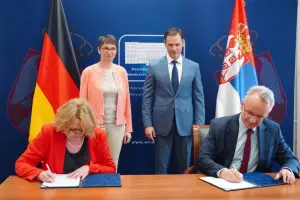- Serbia
Get to know Serbia
- Citizens
Culture and science
Health services
Pension and disability insurance
- Business
Employment
Economy
- Media
- Government
- Contact
Keep in touch
Contact form
Back
Keepin touch
Whether you have a question, comment, suggestion or any problem in the purview of the government, send us your message and we will try to respond as soon as possible. If your problem is not in our purview, we will forward your message to the relevant institution.
Q:
A:
Traders obliged to fully inform buyers before purchase
Belgrade,
1 September 2009
Minister of Trade and Services Slobodan Milosavljevic today stated that the key part of the draft law on consumer protection is the provision stating that proving product faultiness will from now on be the task of traders and services providers, not buyers.
Following a presentation of the proposed legal solutions in the draft law Milosavljevic said that the document envisages traders’ obligation to inform buyers about all details of the product before purchase.
He stressed that the new law will introduce extrajudicial proceedings for settling consumer-related cases, as well as the possibility of collective charges against the trader, which will help to relieve the courts and increase efficiency.
The law specifies in detail the contractual relations between banks and clients, Milosavljevic said, voicing his expectation that after the public debate, the draft law will enter parliamentary procedure in November. The Minister announced that the law will deal with consumer loans, distance selling and time-sharing, adding that it puts the consumer at the centre of all economic activity in the country.
He recalled that after eight years of transition Serbia has not yet achieved consumer protection, adding that consumers are faced with unsafe products, commercials making false claims and the inability to protect their basic rights in practice.
Milosavljevic noted that the draft law can be viewed at the Ministry’s website (www.mtu.gov.rs), adding that the Ministry is ready to take into consideration all proposals that will further improve the law.
European Commissioner for Consumer Protection Meglena Kuneva stressed that the EU tries to protect consumers in the best possible way through directives it has adopted and those it intends to pass.
Kuneva said that consumer protection goes a step further, explaining that consumer rights outnumber those of traders, which is best seen in the example of proving product faultiness, the task appointed to traders.
She explained that trading companies are expected to have their own legal departments, as consumers are insufficiently informed about their legal rights.
According to some EU surveys, EU citizens mostly complain about the finance, energy and transport sectors.
The EU is acutely aware of the importance of consumers, she said, adding that in all EU countries 58% of GDP is generated by consumers.
She recalled that 15 EU directives will be included in the new consumer protection law, which will clearly define all aspects of consumer rights.
He stressed that the new law will introduce extrajudicial proceedings for settling consumer-related cases, as well as the possibility of collective charges against the trader, which will help to relieve the courts and increase efficiency.
The law specifies in detail the contractual relations between banks and clients, Milosavljevic said, voicing his expectation that after the public debate, the draft law will enter parliamentary procedure in November. The Minister announced that the law will deal with consumer loans, distance selling and time-sharing, adding that it puts the consumer at the centre of all economic activity in the country.
He recalled that after eight years of transition Serbia has not yet achieved consumer protection, adding that consumers are faced with unsafe products, commercials making false claims and the inability to protect their basic rights in practice.
Milosavljevic noted that the draft law can be viewed at the Ministry’s website (www.mtu.gov.rs), adding that the Ministry is ready to take into consideration all proposals that will further improve the law.
European Commissioner for Consumer Protection Meglena Kuneva stressed that the EU tries to protect consumers in the best possible way through directives it has adopted and those it intends to pass.
Kuneva said that consumer protection goes a step further, explaining that consumer rights outnumber those of traders, which is best seen in the example of proving product faultiness, the task appointed to traders.
She explained that trading companies are expected to have their own legal departments, as consumers are insufficiently informed about their legal rights.
According to some EU surveys, EU citizens mostly complain about the finance, energy and transport sectors.
The EU is acutely aware of the importance of consumers, she said, adding that in all EU countries 58% of GDP is generated by consumers.
She recalled that 15 EU directives will be included in the new consumer protection law, which will clearly define all aspects of consumer rights.
-
 Belgrade, 11 August 2025
Belgrade, 11 August 2025Support for agricultural projects worth RSD 750 million
-
 Belgrade, 21 July 2025
Belgrade, 21 July 2025Construction of oil pipeline with Hungary to begin early next year
-
 Belgrade/Athens, 17 July 2025
Belgrade/Athens, 17 July 2025Serbia continues to align with EU in field of energy
-
 Kostolac, 14 July 2025
Kostolac, 14 July 2025First solar power plant Petka in Kostolac put into trial operation
-
 Belgrade, 11 July 2025
Belgrade, 11 July 2025Potential for improving cooperation with Belarus in many areas
-
 Požega, 5 July 2025
Požega, 5 July 2025Section of Pakovraće - Požega highway officially opened
-
 Belgrade, 2 July 2025
Belgrade, 2 July 2025Technical specifications defined for Serbia-Hungary oil pipeline
-
 Belgrade, 30 June 2025
Belgrade, 30 June 2025IMF confirms Serbia successfully implementing all agreed reforms
-
 Belgrade, 27 June 2025
Belgrade, 27 June 2025Double Taxation Avoidance Agreement with Germany signed
-
 Kostolac, 25 June 2025
Kostolac, 25 June 2025Construction of Kostolac wind farm nearing completion

